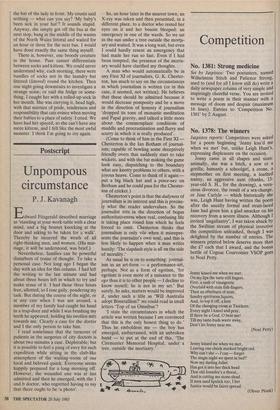Postscript
Unpompous circumstance
P. J. Kavanagh
Edward Fitzgerald described marriage as 'standing at your work-table with a clear mind, and a big bonnet knocking at the door and asking to be taken for a walk'. Thereby he incurred the wrath of all right-thinking men, and women. (His mar- riage, it will be understood, was brief.) Nevertheless, families can be powerful disturbers of trains of thought. To take a personal case. Not long ago I began the day with an idea for this column. I had left the writing to the last minute and had about three hours left in which to try and make sense of it. I had those three hours free, allotted, so I rose gaily, pondering my task. But during the course of the night, or at any rate when I was not around, a member of my family had caught his hand in a trap-door and while I was brushing my teeth he appeared, holding his swollen mitt towards me. Clearly a case for the doctor and I the only person to take him.
I read sometimes that the turnover of patients in the surgeries of city doctors is about two minutes a case. Deplorable; but it is possible to feel a pang of envy for such expedition while sitting in the club-like atmosphere of the waiting-room of our local and beloved quack. Everyone seems happily prepared for a long morning off. However, the wounded one was at last admitted and then he emerged, with the 1 and b doctor, who regretted having to say that there ought to be 'a photo'. So, an hour later in the nearest town, an X-ray was taken and then presented, in a different place, to a doctor who rested her eyes on it and her bosom bleeped: an emergency in one of the wards. So we sat in the sun under a tree outside the mortu- ary and waited. It was a long wait, but even I could hardly resent an emergency that had made her run so fast. Even if I had been tempted, the presence of the mortu- ary would have clarified my thoughts.
A man who would automatically be in any First XI of journalists, G. K. Chester- ton, has much to say on the circumstances in which journalism is written (or in this case, it seemed, not written). He believes that these should be admitted because it would decrease pomposity and be a move in the direction of honesty if journalism 'dropped its tone of monastic meditation and Papal gravity, and talked a little more about the commonplace conditions of muddle and procrastination and flurry and scurry in which it is really produced'.
(Come to think of him in the First XI Chesterton is the Ian Botham of journal- ism; capable of bowling some deceptively friendly overs that suddenly start to take wickets, and with the bat making the game look easy, dispatching to the boundary what are knotty problems to others, with a joyous heave. Come to think of it again put a big black hat and a pince-nez on Botham and he could pass for the Chester- ton of cricket.) Chesterton's point is that the dailyness of journalism is its interest and this is precise- ly what the reader undervalues. So the journalist errs in the direction of bogus authoritativeness when real, confusing life is taking place round him which he feels forced to omit. Chesterton thinks that journalism is only vile when it misrepre- sents the journalist's own soul, and this is less likely to happen when a man writes hastily: 'The slapdash style is all on the side of morality.'
As usual he is on to something: journal- ism as an art-form — a performance-art, perhaps. Not as a form of egotism, 'for egotism is even more of a nuisance to the ego than it is to other people — I decline to know myself; he is not in my set.' But surely, he asks, matters would be improved if, under such a title as 'Will Australia adopt Bimetallism?' we could read in small letters 'Top of an Omnibus'?
'I state the circumstances in which the article was written because I am convinced that this is the only honest thing to do.' Thus he emboldens me — the boy has emerged, embarrassed, with an unbroken hand — to put at the end of this, 'The Cirencester Memorial Hospital, under a tree, outside the mortuary.'


















































 Previous page
Previous page